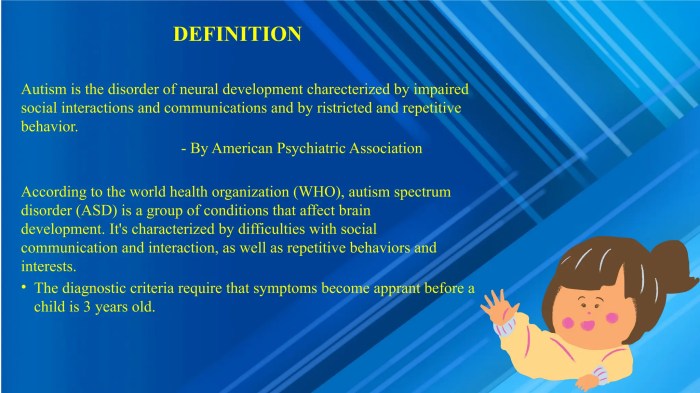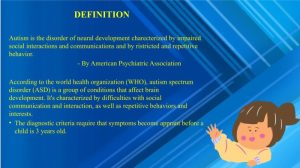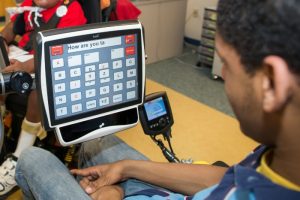
Dive into the world of Autism spectrum disorder support, where we unravel the complexities and offer insights into understanding, therapy, family dynamics, school involvement, and health concerns. Get ready for a journey filled with valuable information and practical tips!
Understanding Autism Spectrum Disorder Support
Autism Spectrum Disorder (ASD) is a neurodevelopmental disorder that affects communication, social interaction, and behavior. Individuals with ASD may have difficulties with verbal and nonverbal communication, repetitive behaviors, and challenges in understanding social cues.
Types of Support for Individuals with ASD
- Behavioral Therapy: This type of therapy focuses on improving specific behaviors, such as social skills, communication, and adaptive skills.
- Speech and Language Therapy: Individuals with ASD may benefit from speech therapy to improve communication skills and language development.
- Occupational Therapy: Occupational therapists work with individuals to improve skills needed for daily living activities, such as fine motor skills and sensory processing.
- Educational Support: Schools may provide individualized education plans (IEPs) to address the unique needs of students with ASD and help them succeed in an academic setting.
- Parent Training and Support: Parents of children with ASD can benefit from training and support to learn strategies for managing behaviors and promoting development.
Importance of Early Intervention and Ongoing Support
Early intervention is crucial for individuals with ASD to maximize their potential and improve outcomes. Providing support early on can help address challenges and promote skill development. Ongoing support throughout the lifespan is also essential to ensure that individuals with ASD continue to receive the help they need to thrive in various areas of life.
Therapy and Interventions for Autism Spectrum Disorder
In addition to providing support and understanding, individuals with Autism Spectrum Disorder (ASD) often benefit from various therapies and interventions tailored to their specific needs. These therapies aim to improve communication skills, social interactions, behavior management, and overall quality of life for individuals with ASD.
Types of Therapies for Autism Spectrum Disorder
- Speech Therapy: Speech therapy focuses on improving communication skills, including speech, language, and social communication. It helps individuals with ASD express their needs and interact with others effectively.
- Occupational Therapy: Occupational therapy addresses sensory processing issues, fine motor skills, and daily living skills to enhance independence and participation in daily activities.
- Applied Behavior Analysis (ABA) Therapy: ABA therapy uses behavioral principles to teach new skills, reduce challenging behaviors, and improve social interactions. It is often used to create individualized treatment plans for children with ASD.
Role of Early Intervention Programs
Early intervention programs play a crucial role in supporting children with ASD by providing specialized services and therapies at a young age. These programs focus on addressing developmental delays, promoting social skills, and enhancing communication abilities to help children reach their full potential. Research has shown that early intervention can lead to significant improvements in outcomes for children with ASD, including better communication, social interactions, and adaptive skills.
Effectiveness of Interventions and Therapies
Various interventions and therapies have been shown to be effective in improving outcomes for individuals with ASD. For example, ABA therapy has been widely researched and proven to be successful in teaching new skills and reducing problem behaviors in individuals with ASD. Speech therapy can also lead to improvements in communication abilities, while occupational therapy helps individuals develop essential life skills and manage sensory challenges effectively.
It is essential to tailor interventions to each individual’s unique needs and strengths to maximize their benefits and promote overall well-being.
Parental and Family Support for Autism Spectrum Disorder
When a child is diagnosed with Autism Spectrum Disorder (ASD), it can be overwhelming for families. It is essential for parents and families to access support and resources to navigate the challenges that come with caring for a child with ASD.
Challenges Faced by Families
Families of individuals with ASD face various challenges, including navigating complex treatment options, managing behavioral issues, and dealing with social stigmas. Accessing appropriate support is crucial to help families cope with these challenges effectively.
Tips for Creating a Supportive Environment
- Establish routines and structure to provide predictability for your child.
- Use visual aids and communication tools to enhance understanding.
- Foster a safe and sensory-friendly environment at home.
- Seek guidance from professionals and support groups for advice and strategies.
- Practice patience, empathy, and understanding in your interactions with your child.
Importance of Self-Care and Support Networks
It is essential for parents and families of individuals with ASD to prioritize self-care and seek support from networks of other families facing similar experiences. Taking care of your physical and mental well-being enables you to better support your child with ASD. Joining support groups, attending counseling sessions, and engaging in self-care activities can help reduce stress and prevent burnout for families.
School and Community Support for Autism Spectrum Disorder
Autism Spectrum Disorder (ASD) affects individuals in various aspects of their lives, including their education and social interactions. Schools and communities play a crucial role in providing support and creating inclusive environments for individuals with ASD.Creating an inclusive environment in schools involves implementing strategies that cater to the unique needs of students with ASD. This may include providing additional support services, such as speech therapy, occupational therapy, and behavioral interventions.
Educators should also receive training on how to effectively support students with ASD in the classroom.
Role of Schools in Providing Support
- Schools should have Individualized Education Programs (IEPs) in place for students with ASD to address their specific needs and goals.
- Implementing sensory-friendly classrooms and providing visual supports can help students with ASD navigate their environment more effectively.
- Creating a safe and structured routine can help students with ASD feel more comfortable and supported in the school setting.
Creating Inclusive Environments
- Promoting acceptance and understanding of individuals with ASD among students and staff can help foster a supportive community within the school.
- Encouraging peer interactions and friendships can help students with ASD feel included and supported in social settings.
- Providing opportunities for social skills development and communication training can empower students with ASD to navigate social interactions more effectively.
Community Programs and Resources
- Community programs, such as social skills groups and recreational activities, can provide individuals with ASD with opportunities for socialization and skill-building outside of school.
- Access to therapy services, support groups, and respite care can offer valuable resources for individuals with ASD and their families in the community.
- Collaboration between schools, families, and community organizations can help create a network of support for individuals with ASD that extends beyond the classroom.
Health Diseases
Autism Spectrum Disorder (ASD) is often associated with various health diseases that can co-occur and present additional challenges for individuals with ASD and their families. Understanding these common health diseases and how to manage them is crucial for providing comprehensive support and treatment.
Common Health Diseases in Individuals with ASD
- Epilepsy: Individuals with ASD have a higher risk of developing epilepsy compared to the general population. Seizures can vary in severity and frequency, requiring close monitoring and appropriate medication.
- Gastrointestinal Issues: Digestive problems such as constipation, diarrhea, or gastroesophageal reflux are commonly reported in individuals with ASD. These issues can impact overall health and wellbeing.
- Sleep Disorders: Many individuals with ASD experience sleep disturbances, including difficulty falling asleep, staying asleep, or maintaining a regular sleep schedule. Poor sleep can exacerbate behavioral challenges and affect daily functioning.
- Immune System Disorders: Autoimmune conditions, allergies, and chronic infections are more prevalent in individuals with ASD. These disorders can impact overall health and may require specialized treatment.
Support and Treatment for Co-Occurring Health Diseases
- Early Detection: Healthcare professionals should conduct regular screenings and assessments to identify any co-occurring health diseases in individuals with ASD. Early detection allows for timely intervention and management.
- Collaborative Care: A multidisciplinary approach involving healthcare providers, therapists, and educators is essential for addressing the complex needs of individuals with ASD and co-occurring health diseases. Collaboration ensures holistic and individualized care.
- Individualized Treatment Plans: Healthcare professionals should develop personalized treatment plans that consider the unique needs and challenges of each individual with ASD. Tailored interventions can optimize health outcomes and quality of life.
Challenges of Managing Health Diseases in Individuals with ASD
- Communication Barriers: Individuals with ASD may have difficulty expressing their symptoms or discomfort, making it challenging to diagnose and treat co-occurring health diseases effectively.
- Sensory Sensitivities: Sensory sensitivities can complicate medical procedures and interventions for individuals with ASD. Healthcare professionals should accommodate sensory needs to ensure successful treatment.
- Behavioral Challenges: Behavioral issues associated with ASD, such as anxiety or aggression, can impact the management of co-occurring health diseases. Integrated approaches that address both behavioral and medical needs are essential.
Health Allergies
Allergies are common in individuals with Autism Spectrum Disorder (ASD) and can have a significant impact on their overall well-being. It is important to understand the prevalence of allergies in individuals with ASD and how to manage them effectively.
Prevalence of Allergies in Individuals with ASD
Allergies are reported to be more prevalent in individuals with ASD compared to the general population. Studies have shown that children with ASD are at a higher risk of developing allergies, including food allergies, environmental allergies, and skin allergies.
Impact of Allergies on Individuals with ASD
Allergies can exacerbate existing symptoms of ASD, such as irritability, hyperactivity, and gastrointestinal issues. It can also affect sleep patterns, mood regulation, and overall quality of life for individuals with ASD. Identifying and managing allergies is crucial in improving the well-being and behavior of individuals with ASD.
Tips for Managing Allergies in Individuals with ASD
- Consult with a healthcare provider to determine specific allergies through testing.
- Implement a tailored allergy management plan, including avoidance strategies and medications as needed.
- Create a safe environment free of allergens at home and school to minimize exposure.
- Educate caregivers, teachers, and peers about the individual’s allergies and the importance of allergy awareness.
- Monitor and track symptoms to identify triggers and patterns for effective management.
Importance of Allergy Awareness
Allergy awareness is crucial in supporting individuals with ASD as it can help prevent allergic reactions, improve quality of life, and promote overall well-being. By being proactive in managing allergies and creating a safe environment, caregivers and support systems can enhance the health and happiness of individuals with ASD.
Health Massage
Massage therapy has been recognized as a beneficial intervention for individuals with Autism Spectrum Disorder (ASD). The gentle touch and pressure applied during a massage session can help alleviate sensory sensitivities often associated with ASD, promoting relaxation and reducing anxiety.
Potential Benefits of Massage Therapy for ASD
- Improves sensory processing: Massage therapy can help individuals with ASD regulate their sensory input, leading to improved sensory processing and decreased sensitivity to stimuli.
- Promotes relaxation: The calming effect of massage therapy can help reduce anxiety and stress levels in individuals with ASD, leading to improved overall well-being.
- Enhances social interaction: Through positive touch and physical contact, massage therapy can help improve social skills and communication in individuals with ASD.
Specialized Massage Techniques for ASD
- Deep pressure massage: Applying deep pressure to the muscles can help individuals with ASD feel grounded and secure, reducing sensory overload.
- Swedish massage: Gentle, flowing strokes can promote relaxation and improve circulation, benefiting individuals with ASD who may have difficulty with motor coordination.
- Craniosacral therapy: This gentle technique focuses on the head, neck, and spine, promoting relaxation and reducing stress in individuals with ASD.
Health Disability

In the context of Autism Spectrum Disorder (ASD), disability refers to the challenges and limitations that individuals with ASD may face in various aspects of their lives. These disabilities can impact communication, social interaction, behavior, and sensory processing, among other areas.
Challenges in Accessing Disability Support Services
Individuals with ASD often face challenges in accessing disability support services due to a lack of understanding and awareness about their unique needs. Some of the barriers they may encounter include:
- Limited availability of specialized services tailored to individuals with ASD
- Long wait times for assessments and interventions
- Complex eligibility criteria that may not fully account for the diverse needs of individuals with ASD
- Stigma and discrimination that can prevent individuals with ASD from seeking help
Advocating for Disability Rights and Accommodations
Advocating for disability rights and accommodations is crucial to ensuring that individuals with ASD receive the support they need to thrive. Some key points to consider include:
- Supporting inclusive education practices that accommodate the diverse learning styles of individuals with ASD
- Promoting employment opportunities that provide reasonable accommodations for individuals with ASD in the workplace
- Advocating for accessible healthcare services that address the specific needs of individuals with ASD
- Raising awareness about the rights of individuals with ASD and fighting against discrimination and ableism
Heartburn and Acid Reflux
Heartburn and acid reflux are common gastrointestinal issues that can affect individuals with Autism Spectrum Disorder (ASD). The relationship between ASD and these conditions is complex, as individuals with ASD may experience symptoms differently due to sensory sensitivities, communication challenges, and behavioral differences.
Symptoms and Early Detection
- Individuals with ASD may have difficulty expressing their discomfort or pain, leading to delayed diagnosis of heartburn and acid reflux.
- Common symptoms in individuals with ASD may include increased irritability, changes in eating habits, refusal to eat certain foods, and regurgitation.
- Early detection is crucial to prevent complications and ensure proper management of heartburn and acid reflux in individuals with ASD.
Tips for Managing Heartburn and Acid Reflux
- Establish a consistent mealtime routine to promote digestion and reduce the risk of heartburn.
- Monitor and limit the intake of trigger foods that may worsen symptoms, such as spicy foods, citrus fruits, and carbonated beverages.
- Encourage adequate hydration to help with digestion and prevent dehydration, which can exacerbate acid reflux.
- Consider sensory sensitivities when introducing new foods or textures, and provide support for individuals who may have difficulty swallowing or chewing.
- Consult with healthcare professionals to explore medication options or behavioral therapies that can help manage heartburn and acid reflux in individuals with ASD.
Closing Summary

As we wrap up our exploration of Autism spectrum disorder support, remember the importance of early intervention, family involvement, and community support in enhancing the lives of individuals with ASD. Let’s continue to spread awareness and foster inclusivity for a brighter future for all.
General Inquiries
How can I create a supportive environment for my child with ASD?
To create a supportive environment, establish routines, provide clear instructions, offer sensory-friendly spaces, and communicate openly with your child’s therapists and educators.
What are some common health diseases that individuals with ASD may experience?
Individuals with ASD may have co-occurring health conditions such as epilepsy, gastrointestinal issues, or sleep disorders. It’s essential to work closely with healthcare professionals to address these concerns.
What role do schools play in supporting students with ASD?
Schools play a crucial role in providing individualized education plans, accommodations, and a supportive learning environment for students with ASD. Collaboration between parents, teachers, and therapists is key to success.





